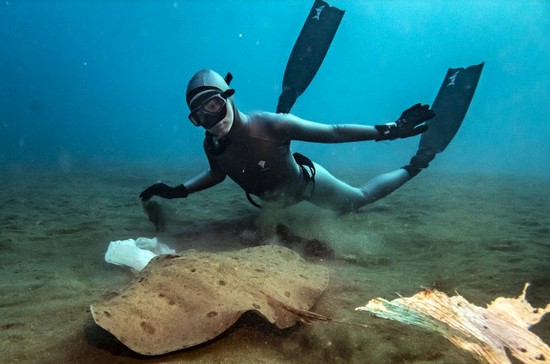Kategori : ENERGY AGENDA NEWS - Tarih : 11 December 2022
Şahika Ercümen, holder of the world record in free-diving and UNDP Türkiye’s Life Below Water Advocate, made a dive in the Mediterranean Sea on 2 December 2022 to raise awareness about the threat that water pollution poses to maritime ecosystems. UNDP organized the event at the Cape of Hırlavuk near Samandağ in Hatay Province to emphasize the importance of local action and community solidarity in solving challenges such as plastic waste, pollution and the climate crisis.
“Our seas and oceans are suffocating,” said Ercümen. “Pollution, overfishing, invasive species, climate change – all these problems created by humanity are starving marine life of the oxygen on which it depends. Today we are sounding the alarm about pollution of the Asi River, but the threat is far bigger. If we endanger life below water then we threaten all humanity, so we need to intensify action at the local level to put a halt to this global problem.”
 Ahead of her dive, Ercümen joined a group of elementary school students in a waste cleanup event along the Mediterranean coast at Samandağ aimed at educating children about “zero waste” practices. 47 students attended the event in which 40 kilos of waste were collected through joint efforts in 1 hour.
Ahead of her dive, Ercümen joined a group of elementary school students in a waste cleanup event along the Mediterranean coast at Samandağ aimed at educating children about “zero waste” practices. 47 students attended the event in which 40 kilos of waste were collected through joint efforts in 1 hour.
The event was part of “Climate Action for Hatay,” a US$1.8 million project funded by the Government of Japan aiming at fighting climate change and protecting the delicate marine ecosystem in Hatay province in southeastern Türkiye. The project is implemented jointly by UNDP Türkiye, the Ministry of Environment, Urbanization and Climate Change, and Hatay Metropolitan Municipality.
The Asi River originates in Lebanon and flows northward through Syria before entering Turkey. Along its 571-kilometer length it accumulates waste that is then discharged into the Mediterranean. The initiative tackles priority measures defined in a local climate action plan that UNDP helped Hatay Province prepare in 2019, including improving waste management and recycling.
“Climate Action for Hatay” has three aims: first, to remove waste from the Asi River as it drains into the Mediterranean at the city of Samandağ; second, to reduce waste dumping into the river through improved regulations and public education; and third, to counter the threats posed by the proliferation of the water hyacinth, an invasive species that clogs rivers, hurts water quality and threatens the local fishing economy.
The project builds on previous UNDP work in Hatay Province, including the construction in 2019 of a US$4 million wastewater treatment plant in Hassa that can serve 60,000 people and has eliminated a source of untreated sewage that previously flowed freely into the Asi River.
The initiative in Türkiye is just one example of the work supported by UNDP’s Climate Promise in more than 100 countries. The Climate Promise is the largest global climate and development offer of support to countries in fulfilling their national pledges to the Paris Agreement.





